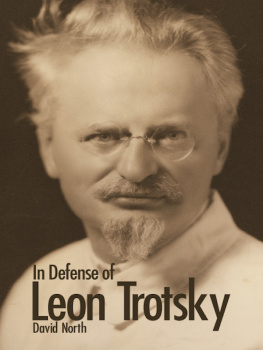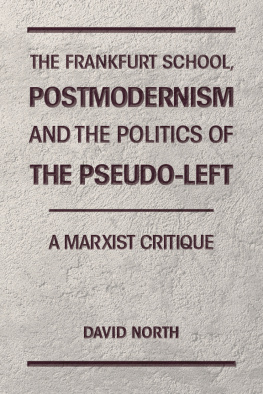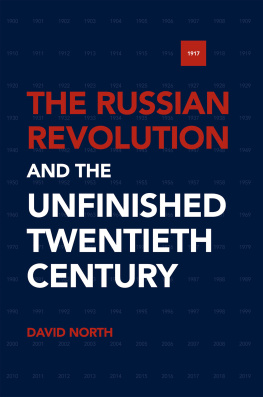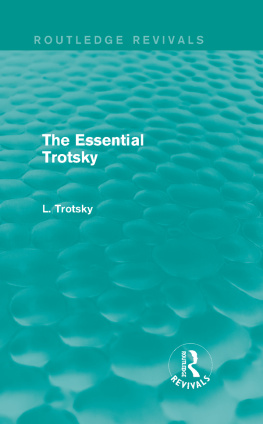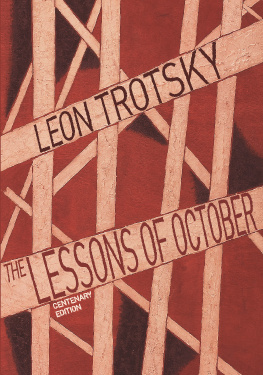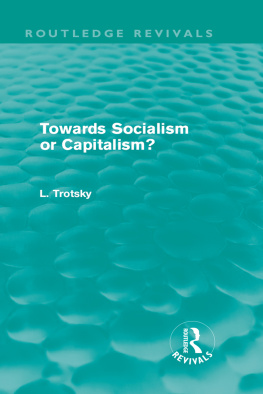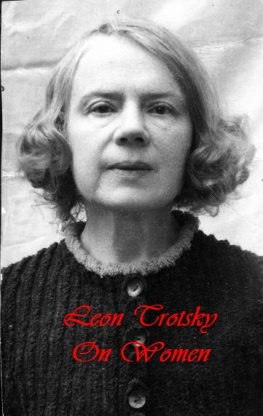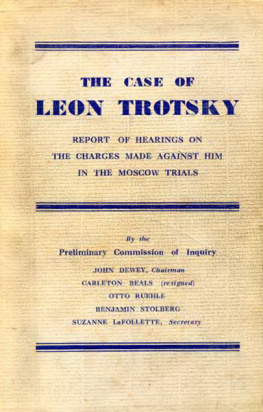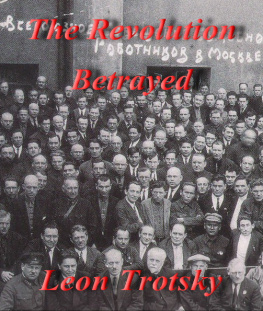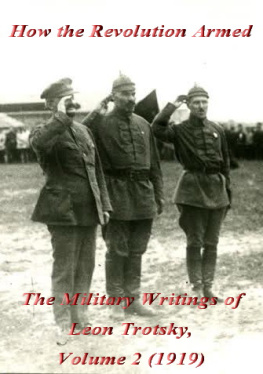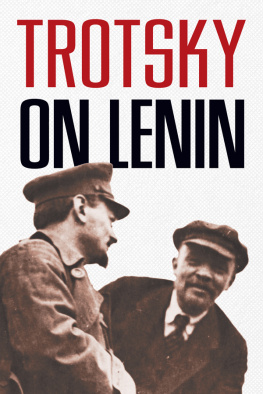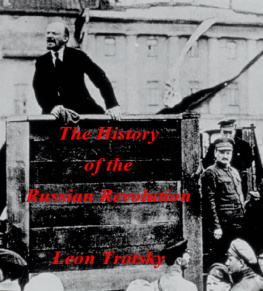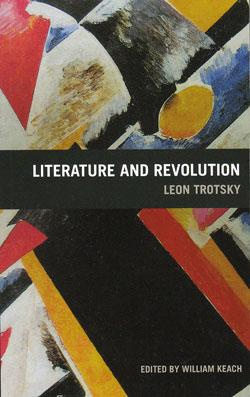In Defense of Leon Trotsky
David North
Mehring Books
Oak Park, Michigan
2010
Published by Mehring Books
P. O. Box 48377
Oak Park, MI 48237
Printed in the United States of America
2010 Mehring Books
All rights reserved.
eISBN : 978-1-893638-32-7
Library of Congress Cataloging-in-Publication Data
North, David.
In Defense of Leon Trotsky / by David North.
p. cm.
Includes bibliographical references and index.
ISBN 978-1-893638-05-1 (alk. paper)
1. Trotsky, Leon, 1879-1940. 2. Trotsky, Leon, 1879-1940--Political and
social views. 3. Trotsky, Leon, 1879-1940--Influence. 4.
Revolutionaries--Soviet Union--Biography. 5. Statesmen--Soviet
Union--Biography. 6. Biography--Political aspects. 7.
Historiography--Political aspects. 8. Soviet Union--History--Errors,
inventions, etc. 9. Soviet Union--Historiography. 10.
Communism--Historiography. I. Title.
DK254.T6N67 2010
947.084092--dc22
2010028363
About the Author
David North has played a leading role in the international socialist movement for nearly 40 years, and is presently the chairperson of the International Editorial Board of the World Socialist Web Site. An authority on the life and political ideas of Leon Trotsky, his many published works include The Heritage We Defend , a history of the Fourth International.
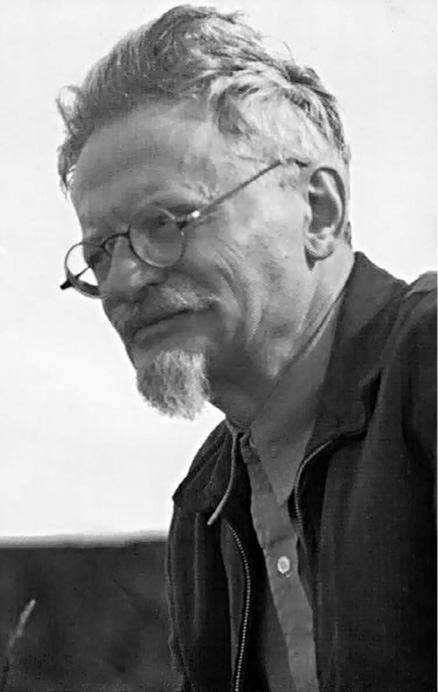
Leon Trotsky in Coyoacn, Mexico, 1940
Introduction
It is difficult to think of another figure in the twentieth century, and perhaps in world history, whose life has been the subject of such unrelenting vilification and falsification as Leon Trotsky. The peculiar intensity of the hatred directed against Trotsky, which persists even 70 years after his death, is bound up with his unique historical role. Trotsky was both the leader of the first socialist revolution and also the implacable opponent of the Stalinist regime that subsequently betrayed that revolution. The Soviet Union no longer exists and the Stalinist regime has disappeared into the dustbin of history. But Trotsky remains a relentlessly contemporary political figure. The significance of his life in world history transcends his role in the Russian Revolution. Leon Trotsky was, above all else, the great tribune and theoretician of world socialist revolution. The passions evoked by his name testify to the enduring significance of Trotskys ideas. Arguments about Trotsky are never simply about what happened in the past. They are just as much about what is happening in the world today, and what is likely to happen in the future.
In October 1917 Trotsky played, next to Lenin himself, the most important role in the Bolshevik seizure of power. His role in the overthrow of the bourgeois Provisional Government was not limited to his operational leadership of the revolutionary insurrection in Petrograd. Though it was Lenin who, between April and October 1917, politically directed the Bolshevik Party toward the conquest of state power, Lenins strategic line drew heavily on the theory of Permanent Revolution elaborated by Trotsky. Moreover, the Soviet regimes survival and ultimate victory in the civil war that raged between 1918 and 1921 owed a great deal to Trotskys activities as principal commander of the Red Army.
But the end of the Civil War marked a turning point in Soviet history and in Trotskys position in the Bolshevik leadership. Though it was not immediately apparent, the adoption of the market-oriented New Economic Policy in 1921a necessary response by the Soviet regime to the calamitous conditions that existed in the country after seven years of world war, revolution and civil warstrengthened more conservative political tendencies within the Russian Communist Party. This process was exacerbated by the absorption of large sections of party cadre, including many Old Bolsheviks, into the rapidly expanding state and party bureaucracy. The setbacks suffered by revolutionary movements in central and Western Europe between 1919 and 1923, especially in Germany, foreclosed the possibility that the massive social and economic problems confronting the Bolshevik regime would be alleviated through the timely establishment of friendly socialist regimes.
Beneath unrelenting domestic and international pressure, the political constituency within the party grew for a redefinition of the basic aims of the Soviet regimeaway from the world revolutionary perspective that had inspired the October Revolution, and with which Trotsky was indelibly identified. Prior to 1923 it had been accepted, as a basic premise of Marxist theory, that the development of socialism in Russia could not be achieved on a national basis. Russia, with its predominantly peasant population and limited industrial base, lacked the resources for a socialist reorganization of its economy. While it was necessary for the Soviet government to work patiently for the development of the economic foundations of a socialist economy, the success of the revolutionary project depended on the victory of the working class in the advanced centers of capitalism. However, this internationalist perspective gave way to an essentially autarkic conception of the economic development of the USSR as a national state. The new outlook found expression in the program of socialism in one country advanced in 1924 by Stalin and Bukharin. This nationalist reorientation intersected with the bureaucracys growing identification of its own privileged social position with national state power.
Trotskys efforts in the autumn of 1923 to draw attention to the symptoms of bureaucratization within the Communist Party and Soviet state immediately evoked a bitter political response, a sure sign that his criticisms impinged on significant material interests. The incurable final illness of Lenin, who died in January 1924, deprived Trotsky of his irreplaceable political ally. From its earliest stages, the campaign against Trotsky assumed the form of historical falsifications. His factional opponents within the ruling Politburo began misrepresenting old pre-1917 political disputes between Lenin and Trotsky. The theory of Permanent Revolution, which, as every party leader understood, formed the basis of the Bolshevik seizure of power, was denounced as Trotskys original heresy. As the struggle against Trotsky and Trotskyism developed, every contribution made by Trotsky to the victory of the October Revolution was denied. In 1918 Stalin had written:
All the work of practical organization of the insurrection was carried out under the direct leadership of the Chairman of the Petrograd Soviet, comrade Trotsky. We can say with certainty that the swift passing of the garrison to the side of the Soviet and the bold execution of the work of the Military Revolutionary Committee the party owes principally and above all to comrade Trotsky.
But only six years later, in November 1924, Stalin claimed that neither in the Party, nor in the October uprising, did Trotsky play any special role, nor could he do so, for he was a relatively new man in our Party in the period of October.
Trotsky was expelled from the Communist Party and the Stalinized Communist International in late 1927, and sent into exile in Alma-Ata, near the Soviet-Chinese border. In January 1929 he was expelled from the Soviet Union. Stalins efforts to suppress Trotskys immense political influence and eradicate his enduring prestige among the Soviet masses required the systematic falsification of revolutionary history. Within little more than one decade, the early anti-Trotsky falsifications of 19231924 metastasized into the monstrous frame-ups of the Moscow Trials, whose nightmarish accusations against Trotsky and all the other principal leaders of the October Revolution provided Stalin with a pretext for the murder of hundreds of thousands of the finest representatives of the revolutionary socialist intelligentsia and working class within the Soviet Union. No allegation was too hideous or farfetched for the Stalinist regime. Trotsky was denounced as the arch-enemy of the Soviet people, a murderous conspirator who organized acts of sabotage and terror against the USSR. Depending on Stalins own political alliances, Trotsky was presented as an agent of fascist Germany at one moment, and an agent of British imperialism at another.

